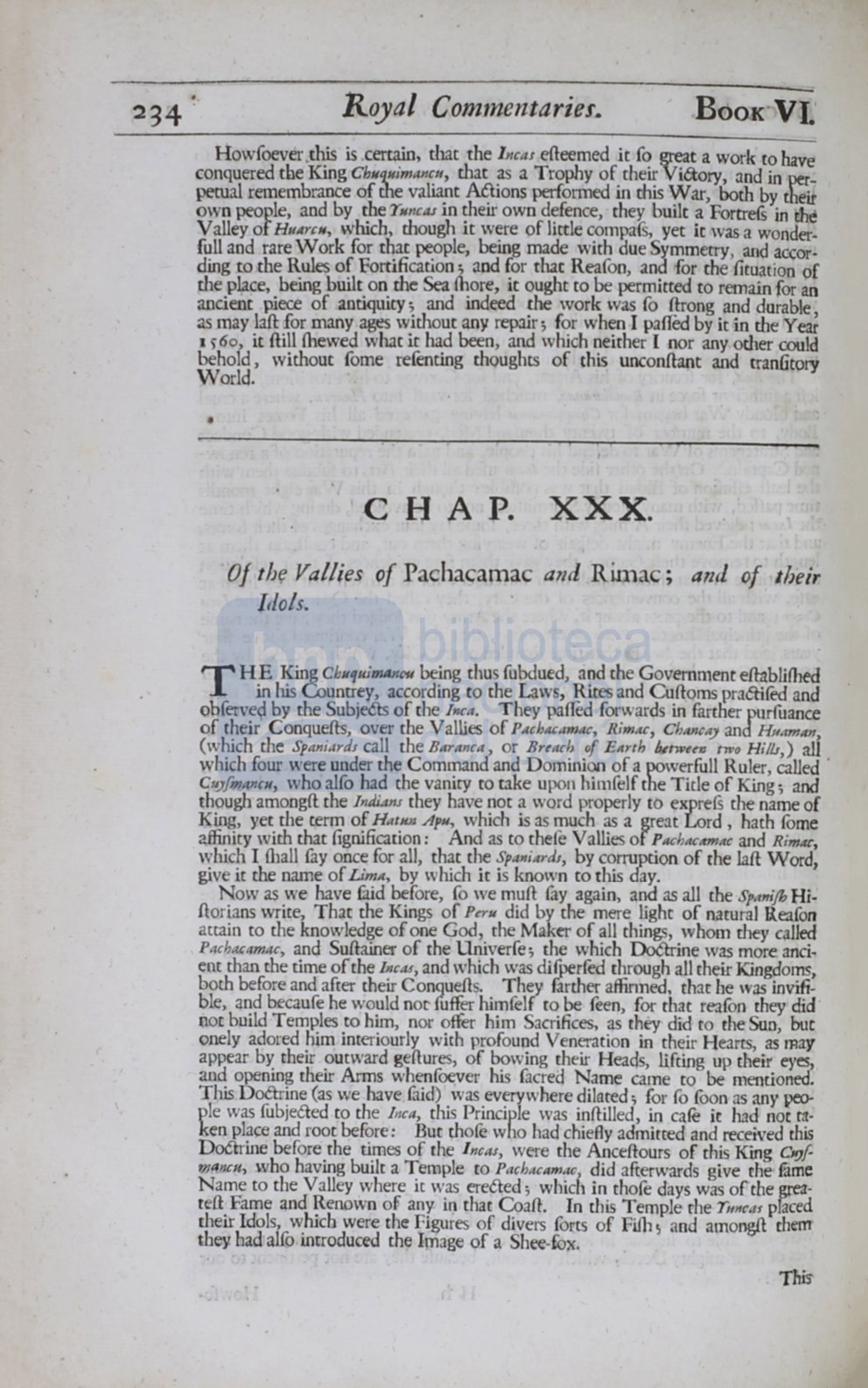

Royal Commentaries.
Ho foe er
.this
is
certain, that the
Incas
e!leemed it fo
great
a work to have
conquered tbe King
Ch11'J!'frnanm,
tbat
a
rophy
f
their
iltory,
and
in
per–
petual
remembrance of
the
valiant
Altions
performed
in
this War, both
by
their
n people, and
by
the
T11nctts
in
their own defence, they uilt a FortretS
in
the
alley
of
H11ArcN,
hich
though
it
ere of lirtle compa , yet
it
was a
wonder–
full and rare Work for that people, being made
·ch due ymmetry and accor·
ding
to the Rules of ortlfication ; and for
that
Reafon, and for the ficuation of
the place, being built on the
fuore,
it
ought
to
be
permitted to remain for an
ancient piece of antiquity; and indeed the work
as fo firong and durable,
may
laft
for
many
ag
'
ithouc
any
repair;
~
r
hen I
affed by
it
in
the Year
1
s-60,
it
ftill
fbe ed
hat
it
had be n, and " hich neith r
nor any other could
ehold,
without fome refenting
th
ugh
of this
unconfiant
and tranfitory
orld.
CH AP.
Of the Va/lies of
P
b
Idols.
xxx.
and
T
HE
King
h11qufrw1ncu
b
ing
thu
fubdu d, and
the Government
eftablifhed
in
his
untrey, according
to
the
La\
,
·
t and Cufioms praetifed and
obfer
ed
by the ubje
of
the
Inca.
They
paffi
d for ard
in
fanner
purfuance
of their Conqueits, o
r cbe
alli
of
Pachacamac,
Rima,
Ch
nc11y
and
H11ama11,
(\ hich the
Spaniards
call the
Baranca,
r
Breach of Earth betweetJ rwo Hill.!,)
all
which
four were under the Command and
omini
of a powerfull
Ruler,
called
c
ryfmanc11,
ho alfo had the aniry to take u n himfelf
the
icle of King;
and
though amongll: the
Indians
they ha e not a
'Ord
roperly to
eJg>relS
the name of
in , yet
the
term
of
HatHn Ap11,
\'
hich ·
much
a
great
Lord , hath fome
2ffiriity \
ith
that
fignificacion :
And
as to chefe
lli
of
P
achtte411Jac
and
Rimac,
which I
£hall
fay
once
for all, that
the
Spaniards,
by
corruption of rhe
lafi:
ord,
giv
it
the name of
Lim1t,
by
"'hich
it ·
kno" n to this
day.
o
as
'e have faid before,
fo'
e mull:
fi
y
again, and as
all
the
Spanijh
Hi·
fiorians write, That
the
·
ngs of
Peru
did
y
che
mere light of natural R.eafon
attain to che kno
ledge ofone God, the M er of all things,
horn
they
called
Pachacam4c,
and ullainer
of th
Uni
rfe;
th
hich Doltrine v as more
and..
ent
than
the
time
of the
lnctU,
and\\
hich was
difperfed
through
all
their
gdoms,
both
before
and after their
onque!l . They
farther
affirmed, that he
\!
as invtti–
ble, and
becaufe he
would not fuffer himfelf co be
feen, for
that r
fc
n
rhey
did ·
not build Temples to him, nor
ffer him
acrifices, as
they
did
t
the Sun,
but
onely
adored
nim
interiourly
ith
r found
neiation in their Hearrs,
as may
appear
by
their
our ard
gefl:ures,
of
bm
ing their Head, lifting up their
eyes,
and opening their Arms
whenfoever
·
facred
ame came to
be
mentioned.
his Doctrine (as
e have faid)
as every here dilated; for
fi
foon as
any
peer
pie
as
fubjeB:ed
co
the
J,ica,
this
rinciple
as
infl:illed,
in
cafe
it
had
not ta–
ken plao and root befor
:
But
thofe who had chiefly admitted and recei ed
thls
Doetrine before rhe times of the
I
ncaJ,
were the Anceft:ours of th· King
C11Jf
manc11,
who having built a
Temple
to
Pachacamac 1
did afi: rwards give
the
R
me
acne to the
alley
here
it
was ereeted; whicn in thofe day
w
of the
grea–
tell:
rune and Renown o any in that Coafi.
In
rn·
Temple the
Tu11ca1
placed
their Id Is, which were the
igures of divers fort
f
ifh
~
and amongfi chem
they
mad
alfo introduced the !mag of a bee- x.
This'














